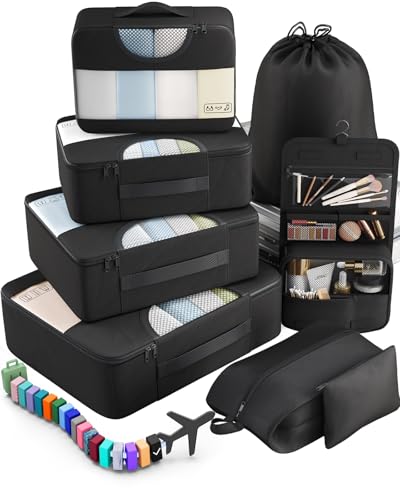In Suriname, they use Type A, B, C, and F power plugs and outlets. The voltage is 127/230V, and the frequency is 60Hz.
So, you’ll definitely need a travel adapter in Suriname. Not all their plugs and outlets are the same as our Type A and B back in the States.
Quick Overview of the Plugs in Suriname:
- Plug type in Suriname: A, B, C, and F
- Standard voltage: 127/230V
- Frequency: 60Hz
- Need a travel adapter? Yes, you do need a travel adapter
- Need a voltage converter? Don’t assume — check the power specs
- Recommended plug adapter: Vintar Universal Travel Adapter Kit
All information is gathered from official sources like local power authorities, IEC standards, and firsthand traveler experiences to ensure accuracy.
The Only Travel Adapter You’ll Need in Suriname
No one wants to deal with charging issues in Suriname. We don’t sell travel adapters, but we’ve found the most reliable and safe option, so you never run out of power. Here it is:
Recommended Travel Plug Adapter
by 1,000+ travelers on Amazon
If you’re already traveling and don’t have one, you can usually snag something locally.
But hey, for your next trip, throw one in your bag before you leave—you’ll save yourself the scavenger hunt later.
Suriname is often combined with trips to Guyana, French Guiana, or Brazil. Make sure to check plug types across borders.
Power Outlets in Suriname
In Suriname, they use Type A, B, C, and F power plugs and outlets.
Type A

Type A outlets have two flat prongs and no grounding pin.
Type B

Type B outlets have two flat prongs and a grounding pin. Type A plugs will also fit.
Type C

Type C outlets have two round prongs and no grounding pin. Type E and F plugs usually fit too, but grounded plugs will need an adapter.
Type F

Type F outlets have two round prongs and grounding clips on the sides. Type C and E plugs will also fit.
Do You Need a Voltage Converter?
If you’re traveling to Suriname, you’ll probably need a voltage converter. The U.S. uses 120V, but the voltage in Suriname is different, meaning your electronics won’t work safely without one.
To avoid electrical problems, always verify the voltage rating on your device before traveling. If it says “100-240V, 50/60 Hz”, your device will work in most places without a converter. This is common for phones, tablets, laptops, cameras, and rechargeable gadgets.

Which Travel Devices May Need a Converter?
Play it safe with your electronics — browse the most trusted voltage converters here.
| Device | Need Converter? | Notes |
|---|---|---|
| Phone | ❌ No (usually) | Most modern phone chargers are dual voltage (100–240V) |
| Laptop | ❌ No (usually) | Check the power brick label for 100–240V |
| Hairdryer | ✅ Yes (often) | High wattage; many models are not dual voltage |
| Electric toothbrush | ⚠️ Check voltage | Some models are 110V only |
| Camera / DSLR | ❌ No (usually) | Most chargers are dual voltage |
| Power bank | ❌ No | Charges via USB, adapter is enough |
| Electric shaver / trimmer | ⚠️ Check voltage | Older or cheaper models may not support 230V |
| Tablet / iPad | ❌ No | All models are dual voltage |
| Portable fan | ✅ Yes (sometimes) | Many models are not compatible with 230V |
| Game console | ⚠️ Check voltage | Newer consoles like PS5 and Xbox are often dual voltage — check to be sure |
| Bluetooth speaker | ❌ No (usually) | Charges via USB |
| E-reader (Kindle, etc.) | ❌ No | USB charging only, no converter needed |
Top Travel Essentials to Pack
A good adapter is just the start. These other essentials help round out your packing list and keep things running smoothly.
Digital Luggage Scale
Packing Cubes
Power Bank
More About Suriname
Suriname is South America’s smallest independent country, tucked between Guyana and French Guiana, with just under 600,000 people. That means a lot of space to explore rainforests, traditional villages, and wildlife-rich wetlands.
This little nation is a melting pot—Creole, Maroon, Javanese, Amerindian, and Hindustani cultures blend into a colorful, harmonious mashup. You’ll hear Dutch on the street, but also Sranan Tongo, Hindi dialects, Papiamento, and more. It’s one of the few countries where a synagogue, mosque, Hindu and Christian temples stand side by side.
Paramaribo, the capital, is a UNESCO-listed gem with wooden colonial architecture and nearly half the country’s population. Beyond the city, the massive Central Suriname Nature Reserve protects mountain rainforests bigger than some small countries—perfect for off-the-beaten-path hiking and wildlife spotting.
A visit to Suriname is often combined with trips to Guyana, French Guiana, and Brazil..




